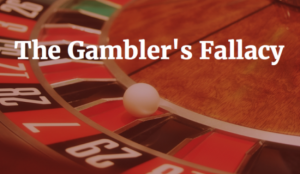Anyone who gambles regularly is likely to have met someone who claims to have a ‘system’ to beat seemingly random odds, and these systems, without exception, fall apart as soon as they are put to the test in any real environment.While we may all shake our heads at the apparently delusional nature of such players, there is a similar issue that anyone can fall victim to, the gambler’s fallacy.But what is the gambler’s fallacy? And how can you ensure you avoid it?As is out nature, we are here with a guide that gives you everything you need to know about the gambler’s fallacy.
What is The Gambler’s Fallacy?
The gambler’s fallacy refers to the assumption that a random event is affected in some way by the random events that came before it, especially if there were identical events.The easiest way to explain this is with a coin toss. If you were to toss a coin nine times, and every single time the coin landed on tails, you may then assume that is statistically more likely for the coin to land on heads the next time round.However, there is no truth in this assumption, as regardless of how many times a coin has been tossed before, the odds (assuming the toss is fair) will always be 50/50.While it is highly unlikely in terms of statistics that a coin will land on tails ten times on a row, it is no less likely to see nine tails and then a heads in ten spins.It is natural for the human brain to try and find patterns in random events, meaning that anyone can fall victim to this assumption, which can be dangerous for gamblers, as proved in 1913 in Monte Carlo.
The Monte Carlo Incident
The Monte Carlo Incident is the most famous case of the gambler’s fallacy and the affect it can have on players.While playing roulette, players at a Monte Carlo casino saw the ball land on black multiple times in a row, this led to an increased number of players betting on red, under the assumption that the streak of black had thrown off the balance and therefore it must be more likely for the ball to land on red on the next spin.However, similarly to the coin toss, the odds did not change on any single spin, and the streak was not broken for a remarkable 26 consecutive spins, leading to many players losing big by trying to pre-empt the end of a random streak using logic.
How to Avoid It
Many gambling strategy books will offer advice based on the gambler’s fallacy, but this advice should be avoided.It is important to remember that every turn on a random game is equally random, and to discount anything that you feel may have an affect on the game.As long as you remember that a random outcome never stops being random, then the gambler’s fallacy should be something you can avoid.








